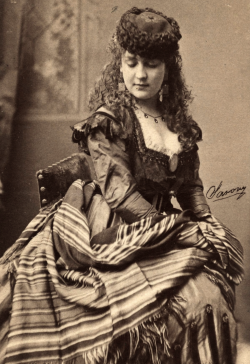

Queer Places:
Montparnasse Cemetery, 3 Boulevard Edgar Quinet, 75014 Paris, France
 Adah Isaacs Menken (June 15, 1835 – August 10, 1868), was an
American
actress,
painter and poet,
and was the highest earning actress of her time.[1]
Evidence in Menken's own writings and other contemporary accounts indicates
that she had romantic and possibly sexual relationships with several women,
including the "Queen of Bohemia" Ada Clare and
writer
George
Sand, whom Menken idolized.
Adah Isaacs Menken (June 15, 1835 – August 10, 1868), was an
American
actress,
painter and poet,
and was the highest earning actress of her time.[1]
Evidence in Menken's own writings and other contemporary accounts indicates
that she had romantic and possibly sexual relationships with several women,
including the "Queen of Bohemia" Ada Clare and
writer
George
Sand, whom Menken idolized.
Menken was best known for her performance in the melodrama Mazeppa, with a climax that featured her apparently nude and riding a horse on stage. After great success for a few years with the play in New York and San Francisco, she appeared in a production in London and Paris, from 1864 to 1866. After a brief trip back to the United States, she returned to Europe. However, she became ill within two years and died in Paris at the age of 33.[2]
Menken told many versions of her origins, including her name, place of birth, ancestry, and religion, and historians have differed in their accounts. Most have said she was born a Louisiana Creole Catholic of mixed race, with European and African ancestry. A celebrity who created sensational performances in the United States and Europe, she married several times and was also known for her affairs. She had two sons, both of whom died in infancy.[3]
Though she was better known as an actress, Menken sought to be known as a writer. She published about 20 essays, 100 poems, and a book of her collected poems, from 1855 to 1868 (the book was published posthumously). Early work was devoted to family and after her marriage, her poetry and essays featured Jewish themes. However, beginning with work published after moving to New York, with which she changed her style, Menken expressed a wide range of emotions and ideas about women's place in the world. Her collection Infelicia went through several editions and was in print until 1902.
In 1862, she married Robert Henry Newell, a humorist and editor of the Sunday Mercury in New York, who had recently published most of her poetry. They were together about three years. Next she wed James Paul Barkley, a gambler, in 1866, but soon returned without him to France, where she was performing. There she had their son, whom she named Louis Dudevant Victor Emanuel Barkley. The baby's godmother was the author George Sand.[1] Louis died in infancy.[1]
Menken wrote of George Sand: “She so infuses me with the spirit of life that I cannot bear to spend an evening apart from her.” Menken married four times, but many contemporaries believed the women’s relationship was intimate in every way. Menken wrote to Hattie Tyng in 1861 and 1862 confessing: "I have had my passionate attachments among women, which swept like whirlwinds over me, sometimes, alas! Scorching me with a furnace-blast, but generally only changing and renewing my capabilities for love. I would "have drunk their souls as it were a ray from Heaven" - have lost myself and lived in them..."
Apparently she was also linked to Algernon Charles Swinburne in a non conventionally "sexual" relationship, she was probably one of his "whipping ladies";the kind of "mistress" she may have been to the masochistic Swinburne was probably not what polite society imagined.
My published books: